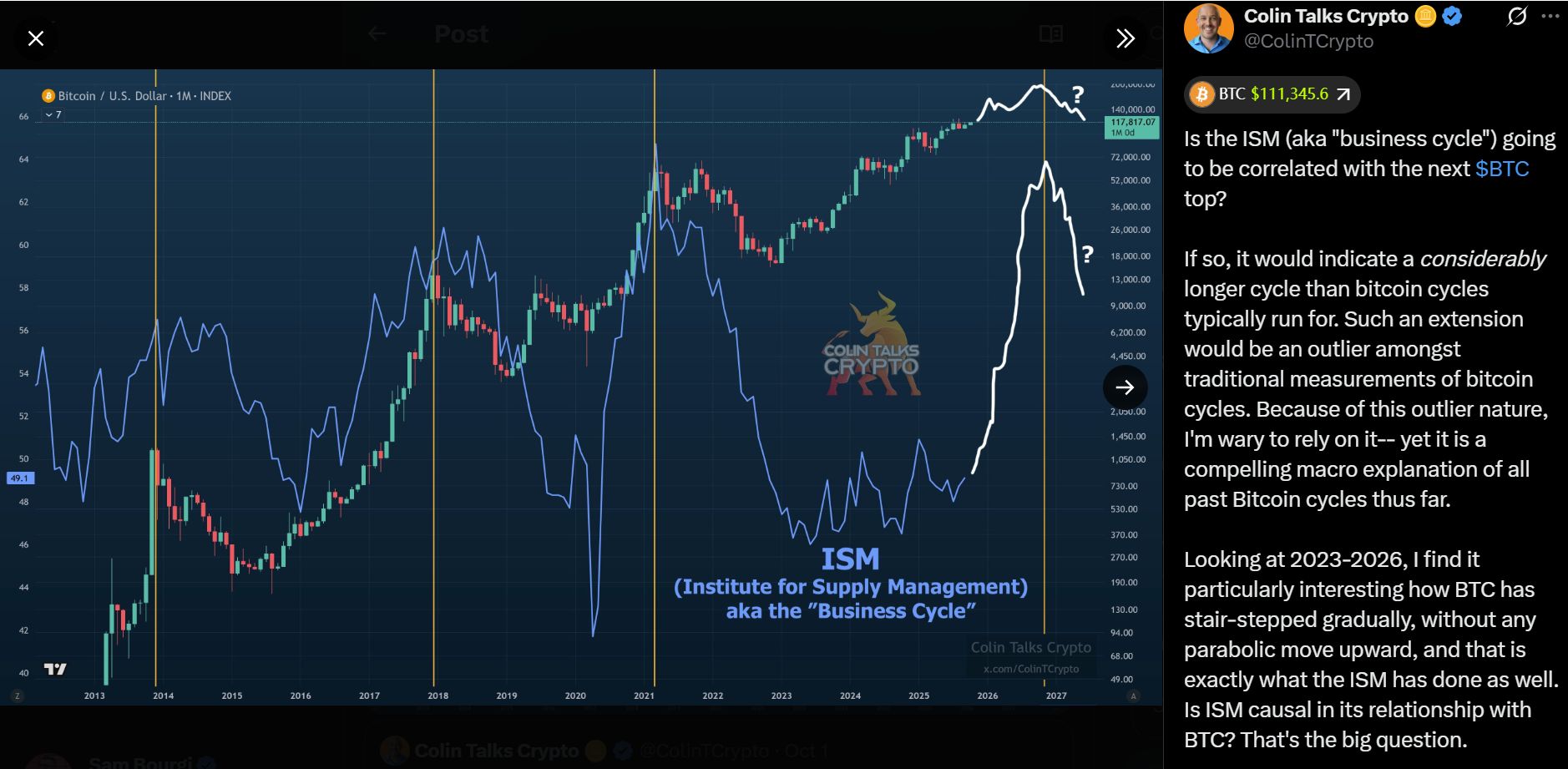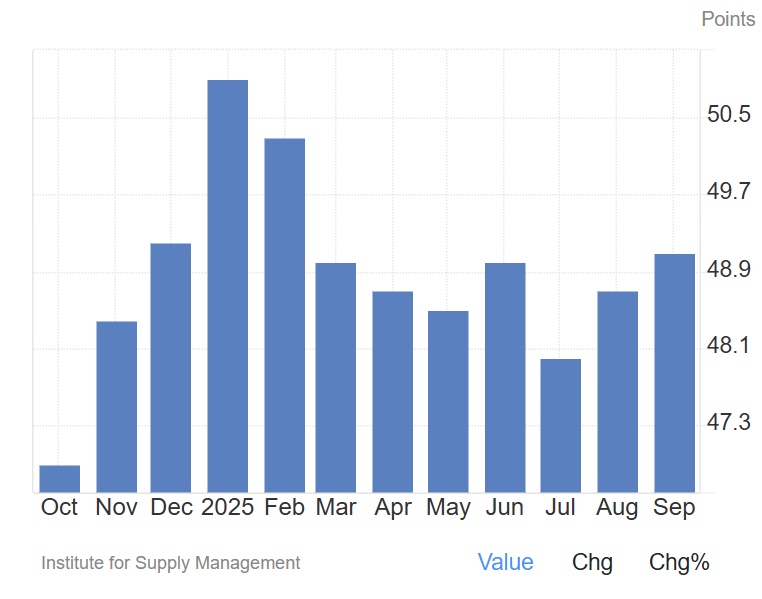ISM Manufacturing PMI suggests Bitcoin cycle may extend beyond historical norm
The Institute for Supply Management’s (ISM) Manufacturing Purchasing Managers’ Index (PMI) has historically aligned with major peaks in Bitcoin’s market cycles — a pattern that, if repeated, could imply a longer-than-usual cycle this time around.
The correlation between the ISM PMI and Bitcoin’s (BTC) price was first popularized by Real Vision’s Raoul Pal and has since gained traction among macro-focused crypto analysts.
“All 3 past Bitcoin cycle tops have broadly aligned with this monthly, oscillating index,” analyst Colin Talks Crypto noted, referencing the recurring overlap between Bitcoin’s market highs and the PMI’s cyclical peaks.
If that relationship holds, Colin added, “it would indicate a considerably longer cycle than bitcoin cycles typically run for.”

The ISM Manufacturing PMI, which measures US industrial activity, has remained below the neutral 50 mark for seven consecutive months, signaling contraction. A sustained move above 50 would suggest renewed economic expansion, historically associated with stronger Bitcoin price performance.
Earlier this year, the PMI briefly climbed above 50 before slipping back into contraction territory, underscoring continued weakness in the manufacturing economy.

Related: Bitcoin treasuries can earn more Bitcoin, says Willem Schroé
US manufacturing struggles to sustain momentum amid tariffs, weak demand
The manufacturing PMI signaled a strong rebound in business sentiment at the start of the year, partly attributed to optimism surrounding the incoming Trump administration and expectations of business-friendly policy.
However, the continued drag from high tariffs, uncertain trade policy and soft global demand has weighed on the sector, potentially extending the business cycle rather than accelerating it.
ISM’s latest report showed a modest uptick in September, with prices rising while exports and imports contracted, suggesting uneven conditions across manufacturing subsectors.
Despite the weakness, ISM noted that manufacturing’s shrinking share of US economic output means a contraction in the PMI does not necessarily signal a recession. ISM has previously observed that a sustained reading above 42.3 generally corresponds with growth in the broader economy.
One purchasing manager from the transportation equipment industry told ISM in September that “business continues to be severely depressed,” citing shrinking profits and “extreme taxes” in the form of tariffs that have raised costs across the supply chain.
“We have increased price pressures both to our inputs and customer outputs as companies are starting to pass on tariffs via surcharges, raising prices up to 20 percent,” they added.
Related: Crypto Biz: Bitcoin whales trade keys for comfort
Disclaimer: The content of this article solely reflects the author's opinion and does not represent the platform in any capacity. This article is not intended to serve as a reference for making investment decisions.
You may also like
Solana Latest Updates: AI-Powered Cryptocurrencies Surge Amid Rising Volatility Concerns
- AI-driven crypto trading sees Solana-based PayAI surge 39.62% in 24 hours, boosted by x402 toolkit and $31.61M market cap. - Solana's SSK ETF gains $24M in weekly inflows, pushing assets past $400M as institutional altcoin confidence grows. - Quantum security firm SEALSQ jumps 79% in 30 days post-NASDAQ uplisting, but 10.1x P/B ratio raises valuation concerns. - AI trading strategies reshape crypto/stock markets, yet volatility risks persist for x402 tokens and AI-linked equities.
Bitcoin News Update: Institutional Investors Surpass Miners, Intensifying Supply and Demand Pressures
- Public companies and institutional investors are buying Bitcoin faster than its daily supply, creating supply-demand imbalances. - Corporate holdings now exceed 4% of total supply, surpassing ETFs, as firms use BTC for inflation hedging and diversification. - Sustained institutional buying could drive Bitcoin toward $200,000 by year-end, but critics warn macroeconomic factors and regulatory risks remain critical variables. - Ethereum's institutional adoption remains fragmented, with major players control
Tech Backers Support AI "Immune System" to Counter Bioterrorism Threats
- Valthos, a biosecurity startup, secures $30M from OpenAI, Founders Fund, and Lux Capital to develop AI tools for real-time detection of engineered biological threats. - The investment aims to combat AI-fueled bioterrorism by integrating AI with biological data to create early-warning systems and rapid countermeasures. - OpenAI's involvement reflects a broader industry shift toward multi-layered biosecurity, emphasizing proactive defense against dual-use AI risks. - Valthos plans global partnerships to bu

Ray Dalio Warns of Potential US Dollar Crisis
